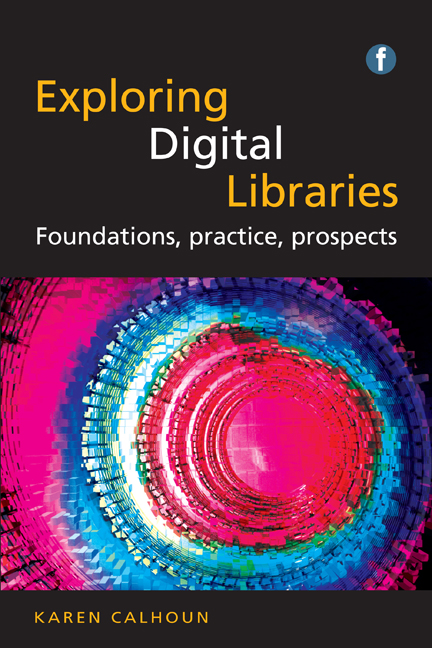Book contents
- Frontmatter
- Dedication
- Contents
- List of figures and tables
- Preface
- Acknowledgements
- Glossary
- 1 Emergence and definitions of digital libraries
- 2 Outcomes of digital libraries’ first decade
- 3 Key themes and challenges in digital libraries
- 4 Digital library collections: repositories
- 5 Hybrid libraries
- 6 Social roles of digital libraries
- 7 Digital libraries and their communities
- 8 The prospects of open access repositories
- 9 Digital libraries and the social web: scholarship
- 10 Digital libraries and the social web: collections and platforms
- References
- Index
8 - The prospects of open access repositories
Published online by Cambridge University Press: 08 June 2018
- Frontmatter
- Dedication
- Contents
- List of figures and tables
- Preface
- Acknowledgements
- Glossary
- 1 Emergence and definitions of digital libraries
- 2 Outcomes of digital libraries’ first decade
- 3 Key themes and challenges in digital libraries
- 4 Digital library collections: repositories
- 5 Hybrid libraries
- 6 Social roles of digital libraries
- 7 Digital libraries and their communities
- 8 The prospects of open access repositories
- 9 Digital libraries and the social web: scholarship
- 10 Digital libraries and the social web: collections and platforms
- References
- Index
Summary
Overview
This chapter focuses on the potential of open access repositories for having a distinctive positive impact on scholarship and, more broadly, on their prospects for increasing the social and economic value of digital libraries. In addition to extending Chapter 4's discussion of open access repositories into new territory, it relates the frameworks presented in Chapters 6 and 7 to this particular type of digital library. Topics include subject-based and institutional repositories and their value; issues around recruiting repository content, including deposit mandates; legal frameworks, copyright and open access; discipline-specific norms, practices and reward systems; the discoverability of scholarly content; the sustainability of repositories; e-research data management; and prospects for the emergence of a global ecosystem of repositories.
Successful subject-based repositories
The most successful subject-based repositories have grown organically around the scholarly communities they serve (see the examples in Chapters 2, 4, 6 and 7), and they are woven into the way their disciplines communicate. As Erway (2012) notes in her review of several thriving subject repositories, ‘the central repository for a researcher's field of study is where he goes for information, to see what's been published, and to look for collaborators. It's only natural that he would think of the same location when it comes time for him to deposit his work.’ Due to their firm foundations within communities of research and practice, the successful subject repositories have tended to attract more submissions than institutional repositories.
Adamick and Resnik-Zellen wrote two articles about subject repositories (2010a; 2010b). The second article profiles ten selected subject repositories across nine metrics: year founded, subjects covered, software, content types, deposit policies, copyright policies, hosting, funding and governance. Overlaying Iriberri and Leroy's 2009 life-cycle model of online communities (Figure 7.1) on the profiles of these successful subject repositories, it is clear that the repositories have evolved through the life cycle, from a strong community orientation at inception to a high degree of trust and participation at maturity. As a result, while Google is an important referrer of searches to subject repositories, the most successful repositories can be said to be destination sites (sites that people visit by going directly to their URLs through typing or bookmarks). As discussed later, this has implications for repository interface design and development.
- Type
- Chapter
- Information
- Exploring Digital LibrariesFoundations, Practice, Prospects, pp. 179 - 208Publisher: FacetPrint publication year: 2014

